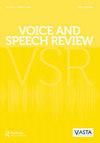Framing the “Vocal Traditions” Series
IF 0.6
Q1 Arts and Humanities
引用次数: 3
Abstract
Ultimately, the “Vocal Traditions” series is a collection of articles in the Voice and Speech Review (VSR) from 2017–2022 that focus on varying vocal pedagogies. This project sought to offer voice teachers a deeper knowledge of pedagogical history and a wider understanding of different voice training schools and traditions, which highlighted historically important voice teachers and schools of thought in the world of vocal training, particularly as it relates to voice and speech. In many ways, I orchestrated the series of articles that I always wanted to read. When I was in an undergraduate actor training program, the voice and speech teacher exclusively taught a singular voice method, but the teacher never told us that. We just had “voice class.” And while I grew from the training, I knew even then that the training lacked context to the wider field. The acting teachers acknowledged lineages and variety to acting methods and techniques. “I trained with Uta Hagen,” or “We do Meisner in this class.” And they also acknowledged that they offered a perspective on acting, and the teachers acknowledged that many other perspectives existed. This standpoint was not the case in my voice training classes. In graduate school, the voice and speech instructor offered training from several different voice pedagogies, which I believe was a great luxury and benefit, but no resource gave a broader context to the field. For a grad school research project (in circa 2003), I wanted to examine different kinds of speech pedagogy. The VSR had just begun publishing at the time, but I neither had access to it nor knew it existed. And even if I had, those early VSR volumes did not include a systematic discussion of varying vocal pedagogies, at least to any significant degree. And even years later when I decided to focus on becoming a voice trainer, I still could not find a text that offered an expansive view of the field. Suffice to say, this gap in the literature has always bothered me, so when I became Editor of the VSR, filling this gap was a top agenda item. Bartow’s (2006) book on American actor training remains a favorite of mine. He edits a volume that looks at the major schools of American acting, as they existed at the turn of the twenty-first century. And without question, his book helped to inspire me to solicit and create this vocal series. I must also credit Saklad (2011) with her book, Voice and Speech Training in the New Millennium: Conversations with Master Teachers, since构建“声乐传统”系列
最终,“声乐传统”系列是《声音与演讲评论》(VSR)2017年至2022年的一系列文章,重点关注不同的声乐教学法。该项目旨在为声乐教师提供更深入的教学史知识,并更广泛地了解不同的声乐培训学校和传统,这些学校和传统突出了声乐培训世界中具有历史意义的声乐教师和思想流派,特别是在与声乐和演讲相关的领域。在很多方面,我精心策划了一系列我一直想读的文章。当我在一个本科生演员培训项目中时,语音和演讲老师专门教授一种独特的声音方法,但老师从未告诉我们。我们刚刚上了“声乐课”。虽然我在训练中成长,但即使在那时我也知道训练缺乏更广泛的背景。表演老师承认表演方法和技巧的谱系和多样性。“我和乌塔·哈根一起训练过,”或者“我们在这个班上做梅斯纳。”他们也承认,他们提供了一种表演的视角,老师们也承认,还有很多其他的视角。在我的声音训练课上,情况并非如此。在研究生院,语音和演讲讲师提供了来自几种不同语音教学法的培训,我认为这是一种极大的奢侈和好处,但没有任何资源能为该领域提供更广泛的背景。对于一个研究生院的研究项目(大约在2003年),我想研究不同类型的言语教学法。VSR当时刚刚开始出版,但我既没有机会访问它,也不知道它的存在。即使我有,那些早期的VSR卷也没有包括对不同声乐教学法的系统讨论,至少在很大程度上是这样。即使几年后,当我决定专注于成为一名语音教练时,我仍然找不到一篇能提供广阔视野的文本。可以说,文献中的这一空白一直困扰着我,所以当我成为《VSR》的编辑时,填补这一空白是当务之急。巴托(Bartow)2006年出版的一本关于美国演员培训的书仍然是我的最爱。他编辑了一本书,着眼于21世纪之交美国表演的主要流派。毫无疑问,他的书激发了我征集和创作这个声乐系列的灵感。我还必须赞扬Saklad(2011)的著作《新千年的语音和言语训练:与大师教师的对话》,因为
本文章由计算机程序翻译,如有差异,请以英文原文为准。
求助全文
约1分钟内获得全文
求助全文
来源期刊

Voice and Speech Review
Arts and Humanities-Visual Arts and Performing Arts
CiteScore
1.00
自引率
66.70%
发文量
51
 求助内容:
求助内容: 应助结果提醒方式:
应助结果提醒方式:


